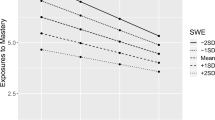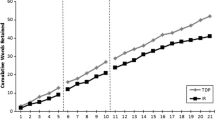Abstract
The Strategic Incremental Rehearsal (SIR) intervention, a modified version of Incremental Rehearsal, is an efficient flashcard procedure that has demonstrated effectiveness on sight word acquisition for children who exhibit reading difficulties. However, to date, the procedure has not been evaluated with children identified with a reading disability who have a history of receiving special education services. This study uses a multiple baseline design across participants to examine the effects of SIR with a modified criterion for removal on sight word reading with three third-grade participants receiving special education services for a specific learning disability in reading. Results indicated sight word reading increased for all 3 participants at the onset of intervention compared to baseline. The total intervention time for each participant ranged from 16 to 48 min. All 3 participants correctly read a minimum of 21 out of 25 targeted words at a 5-week maintenance check. The results indicated that SIR with a modified criterion of removal is a potentially effective and efficient intervention for sight word reading for participants with specific learning disabilities in reading.

Similar content being viewed by others
References
American Psychiatric Association. (2013). Diagnostic and statistical manual of mental disorders (5th ed). Washington, DC.
Banda, D., & Therrien, W. (2008). A teacher’s guide to meta-analysis. Teaching Exceptional Children, 41, 66–71.
Burns, M. K. (2007). Comparison of opportunities to response within a drill model when rehearsing sight words with a child with mental retardation. School Psychology Quarterly, 22, 250–263.
Burns, M., Ardoin, S., Parker, D., Hodgson, J., Klingbeil, D., & Scholin, S. (2009). Interspersal technique and behavioral momentum for reading word lists. School Psychology Review, 38(3), 428–434.
Burns, M., Dean, V., & Foley, S. (2004). Preteaching unknown keywords with incremental rehearsal to improve reading fluency and comprehension with children identified as reading disabled. Journal of School Psychology, 42, 303–314. https://doi.org/10.1016/j.jsp.2004.04.003.
Burns, M. K., Aguilar, L. N., Young, H., Preast, J. L., Taylor, C. N., & Walsh, A. D. (2019). Comparing the effects of incremental rehearsal and traditional dill on retention of mathematics facts and predicting the effects with memory. School Psychology, 34(5), 521–530. https://doi.org/10.1037/spq0000312.
Burns, M. K., Zaslofsky, A. F., Kanive, R., & Parker, D. C. (2012). Meta-analysis of incremental rehearsal using phi coefficients to compare single-case and group designs. Journal of Behavioral Education, 21, 185–202. https://doi.org/10.1007/s10864-012-9160-2.
Child Trends Databank. (2018). Children who repeated a grade. https://www.childtrends.org/?indicators=children-who-repeated-a-grade.
Codding, R. S., Archer, J., & Connell, J. (2010). A systematic replication and extension of using incremental rehearsal to improve multiplication skills: An investigation of generalization. Journal of Behavioral Education, 19, 93–105.
Cortiella, C., & Horowitz, S. H. (2014). The State of Learning Disabilities: Facts, Trends, and Emerging Issues (3rd ed.). National Center for Learning Disabilities.
Dolch Word. (n.d.). Retrieved from https://www.dolchword.net/.
Fountas, I., & Pinnell, C. G. S. (2008). Fountas and Pinnell benchmark assessment system 1. Portsmouth, NH: Heinemann.
Giangreco, M., Broer, S., & Edelman, S. (2010). That was then, this is now! Paraprofessional support for students with disabilities in general education classrooms. Exceptionality, 10, 47–64.
Hammerschmidt-Snidarich, S. M., Edwards, L. M., Christ, T. J., & Thayer, A. J. (2019). Leveraging technology: A multi-component personalized system of instruction to teach sight words. Journal of School Psychology, 72, 150–171. https://doi.org/10.1016/j.jsp.2018.12.005.
Herbers, J., Cutuli, J., Supkoff, L., Heistad, D., Chan, C., Hinz, E., et al. (2012). Early reading skills and academic achievement trajectories of students facing poverty, homelessness, and high residential mobility. Educational Researcher, 41(9), 366–374. https://doi.org/10.3102/0013189X12445320.
Horowitz, S. H., Rawe, J., & Whittaker, M. C. (2017). The State of Learning Disabilities: Understanding the 1 in 5. New York: National Center for Learning Disabilities. Retrieved from https://www.ncld.org/wp-content/uploads/2017/03/Executive-Summary.Fin_.03142017.pdf
Individuals with Disabilities Education Act, 20 U.S.C. § 1400 (2004). Retrieved from https://sites.ed.gov/idea/regs/b/a/300.8/c/10.
January, S., Lovelace, M., Foster, T., & Ardoin, S. (2017). A comparison of two flashcard interventions for teaching sight words to early readers. Journal of Behavioral Education, 26(2), 151–168. https://doi.org/10.1007/s10864-016-9263-2.
Joseph, L. M., & Nist, L. M. (2006). Comparing the effects of unknown-known ratios on word reading learning versus learning rates. Journal of Behavioral Education, 15, 69–79. https://doi.org/10.1007/s10864-006-9008-8.
Klingbell, D. A., January, S. A. A., & Ardoin, S. P. (2019). Comparative efficacy and generalization of two word-reading interventions with English learners in elementary school. Journal of Behavioral Education. https://doi.org/10.1007/s10864-019-09331-y.
Kupzyk, S., Edward, J. D., III, & Andersen, M. N. (2011). A comparison of two flash-card methods for improving sight-word reading. Journal of Applied Behavior Analysis, 44, 781–792. https://doi.org/10.1901/jaba.2011.44-781.
Lenz, S. (2012). Calculating effect size in single-case research: A comparison of non-overlap methods. Measurement and Evaluation in Counseling and Development, 46, 64–73. https://doi.org/10.1177/0748175612456401.
MacQuarrie, L., Tucker, J., Burns, M., & Hartman, B. (2002). Comparison of retention rates using traditional, drill sandwich, and incremental rehearsal flashcard methods. School Psychology Review, 31, 584–595.
Miles, K., & Ehri, L. (2017). Learning to read words on flashcards: Effects of sentence contexts and word class in native and nonnative english-speaking kindergartners. Early Childhood Research Quarterly, 41, 103–113. https://doi.org/10.1016/j.ecresq.2017.06.001.
Murray, B. A., McIlwain, M. J., Wang, C., Murray, G., & Finley, S. (2019). How do beginners learn to read irregular words as sight words? Journal of Research in Reading, 42, 123–136. https://doi.org/10.1111/1467-9817.12250.
National Center for Education Statistics. (2019, n.d.). The condition of education: students with disabilities. Institute of Education Sciences. https://nces.ed.gov/programs/coe/indicator_cgg.asp.
National Reading Panel. (2000). Teaching children to read: An evidence-based assessment of the scientific research literature on reading and its implications for reading instruction. Washington, DC: National Institute for Literacy.
Neef, N. A., Iwata, B. A., & Page, T. J. (1977). The effects of known-item interspersal on acquisition and retention of spelling and sight reading words. Journal of Applied Behavior Analysis, 10, 738. https://doi.org/10.1901/jaba.1977.10-738.
Nevin, J. A., Mandell, C., & Atak, J. R. (1983). The analysis of behavioral momentum. Journal of the Experimental Analysis of Behavior, 39, 49–59. https://doi.org/10.1901/jeab.1983.39-49.
Nist, L., & Joseph, L. M. (2008). Effectiveness and efficiency of flashcard drill instructional methods on urban firstgraders′ word recognition, acquisition, maintenance, and generalization. School Psychology Review, 37(3), 294–308.
Petersen-Brown, S., & Burns, M. K. (2019). Enhancing maintenance and generalization of sight words taught with incremental rehearsal: Applying the depth of processing and generalization frameworks. American Psychological Association, 34(3), 307–317. https://doi.org/10.1037/spq0000294.
Rahn, N. L., Wilson, J., Egan, A., Brandes, D., Kinkel, A., Peterson, M., et al. (2015). Using incremental rehearsal to teach letter sounds to English language learners. Education and Treatment of Children, 38(1), 71–92.
Ramsay, N. (2003). Mrs. Perkins Dolch words. Retrieved from https://www.mrsperkins.com.
Richman, D. M., Grubb, L., & Thompson, S. (2018). Descriptive analysis and comparison of strategic incremental rehearsal to “Business as Usual” sight-word instruction for an adult nonreader with intellectual disability. Developmental Neurorehabilitation, 21(1), 23–31. https://doi.org/10.1080/17518423.2016.1238412.
Scruggs, T. E., Mastropieri, M. A., & Casto, G. (1987). The quantitative synthesis of single subject research: Methodology and validation. Remedial and Special Education, 8, 24–33. https://doi.org/10.1177/074193258700800206.
Scruggs, T. E., & Mastropieri, M. A. (1998). Summarizing single-subject research: Issues and applications. Behavior Modification, 22, 221–242. https://doi.org/10.1177/01454455980223001.
Skinner, C. H. (2008). Theoretical and applied implications of precisely measuring learning rates. School Psychology Review, 37, 309–314.
Taylor, C. N., Aguilar, L., Burns, M. K., Preast, J. L., & Warmbold-Brann, K. (2018). Reliability and relationship to retention of assessing an acquisition rate for sight words with kindergarten participants. Journal of Psychoeducational Assessment, 36(8), 798–807. https://doi.org/10.1177/0734282917707144.
Tucker, J. A. (1988). Basic flashcard technique when vocabulary is the goal. Chattanooga, TN: Unpublished teaching materials, University of Tennessee at Chattanooga.
Varma, S., & Schleisman, K. B. (2014). The cognitive underpinnings of incremental rehearsal. School Psychology Review, 43(2), 222–228.
Funding
The study was not funded.
Author information
Authors and Affiliations
Corresponding author
Ethics declarations
Conflict of interest
The authors declare that they have no conflict of interest.
Ethical Approval
All procedures performed in studies involving human participants were in accordance with the ethical standards of the institutional and/or national research committee and with the 1964 Helsinki Declaration and its later amendments or comparable ethical standards.
Human and Animal Rights
This article does not contain any studies with animals performed by any of the authors.
Informed Consent
Informed consent was obtained from participant’s caregivers and informed assent was obtained from all participants of the study.
Additional information
Publisher's Note
Springer Nature remains neutral with regard to jurisdictional claims in published maps and institutional affiliations.
Rights and permissions
About this article
Cite this article
Phipps, L., Robinson, E.L. & Grebe, S. An Evaluation of Strategic Incremental Rehearsal on Sight Word Acquisition Among Students with Specific Learning Disabilities in Reading. J Behav Educ 31, 281–297 (2022). https://doi.org/10.1007/s10864-020-09398-y
Published:
Issue Date:
DOI: https://doi.org/10.1007/s10864-020-09398-y




